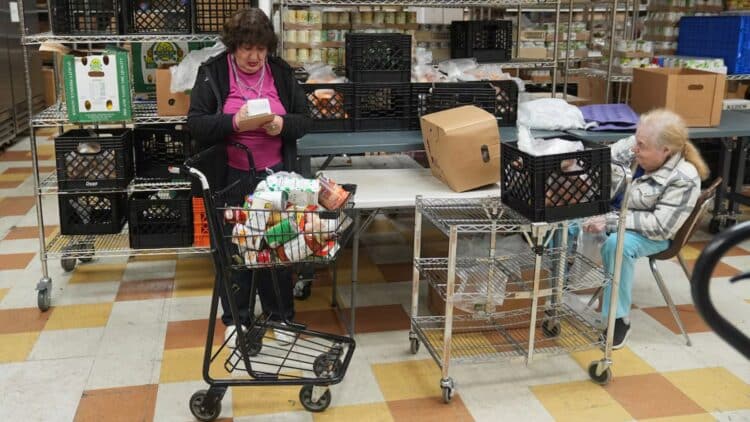The federal government shutdown and the decision to halt benefits from the Supplemental Nutrition Assistance Program (SNAP) are having catastrophic consequences in the United States. The United States Department of Agriculture (USDA) announced the suspension of these payments for the month of November, which has put the entire country on alert. This has caused a massive surge in assistance at food banks from affected families and individuals, which are running out of resources, as reported by The Associated Press. According to the federal government, more than 40 million Americans are enrolled in SNAP, which means that 1 in 8 people have an EBT card to purchase their food, and they will not be able to do so this November.
Charitable organizations have stated that since the COVID-19 pandemic and with the rise of inflation, the demand from people seeking their services has continued to grow. Testimonies such as those from Reggie Gibbs of Indianapolis or Martina McCallop of Washington D.C. show the concern of the beneficiaries. According to Claire Babineaux-Fontenot, the executive director of Feeding America, the situation is not only very serious but is getting even worse. According to George Matysik, the executive director of the Share Food Program in the Philadelphia area, he had never experienced a situation like this.
Some states are trying to alleviate the situation, such as New York, where Governor Kathy Hochul announced a release of $30 million in emergency funds, or New Mexico, where Governor Michelle Lujan Grisham also accelerated the disbursement of $8 billion to food banks. Other states such as Louisiana, Vermont, or Virginia announced that they would seek to keep the food supply flowing, even if the federal program remained stalled.
Federal Government Shutdown and SNAP
The federal government shutdown and its resulting halt to the Supplemental Nutrition Assistance Program (SNAP) is causing quite worrying consequences across the country. More than 70 million Americans rely on this type of benefit to be able to eat, making November particularly difficult. Following the Trump Administration’s refusal to use emergency funds, those affected have been forced to flock to food banks, which have seen an increased demand since the COVID-19 pandemic and with the rise in inflation.
According to The Associated Press, the demand experienced by food banks is reaching almost twice the number of people they normally serve in a day, as is the case with the Central Christian Church food bank in downtown Indianapolis. According to volunteer Beth White, “There is a higher demand. And we know this has been happening since the economy slowed down”.
SNAP suspension
The announcement from the United States Department of Agriculture (USDA) to warn about the suspension of SNAP payments for the month of November included the following words: “In short, the well has run dry. For the moment, no benefits will be issued on November 1.” In light of this announcement and with Trump eliminating programs that provided more than $1 billion to schools and food banks to combat hunger, the situation is becoming truly complicated.
Work of food banks
According to the executive director of Feeding America, Claire Babineaux-Fontenot, “If SNAP is eliminated, the consequences are catastrophic. I suppose people take for granted that someone will stop it before it gets worse. Well, it’s already too serious. And it’s getting worse.” Meanwhile, the executive director of the Shared Food Program in the Philadelphia area, George Matysik, stated that a state government budget pause had already cut funding for his program. “I’ve been here for seven years,” Matysik said. “I’ve never seen our warehouses as empty as they are now.”
States do their part
Some states have activated emergency budgets to mitigate the effects of the alarming and serious situation. In New York, Governor Kathy Hochul has announced the allocation of $30 million in food assistance funds, aimed at supplying food banks. Meanwhile, New Mexico Governor Michelle Lujan Grisham has announced that the delivery of $8 billion already allocated to food banks will be accelerated.
Other states like Vermont, Louisiana, and Virginia have also assured that they will take the necessary measures to keep food assistance flowing, regardless of what happens with the government shutdown. The other side of the coin shows states that cannot cope with this type of emergency, especially if they do not receive reimbursement, as is the case in Arkansas.
